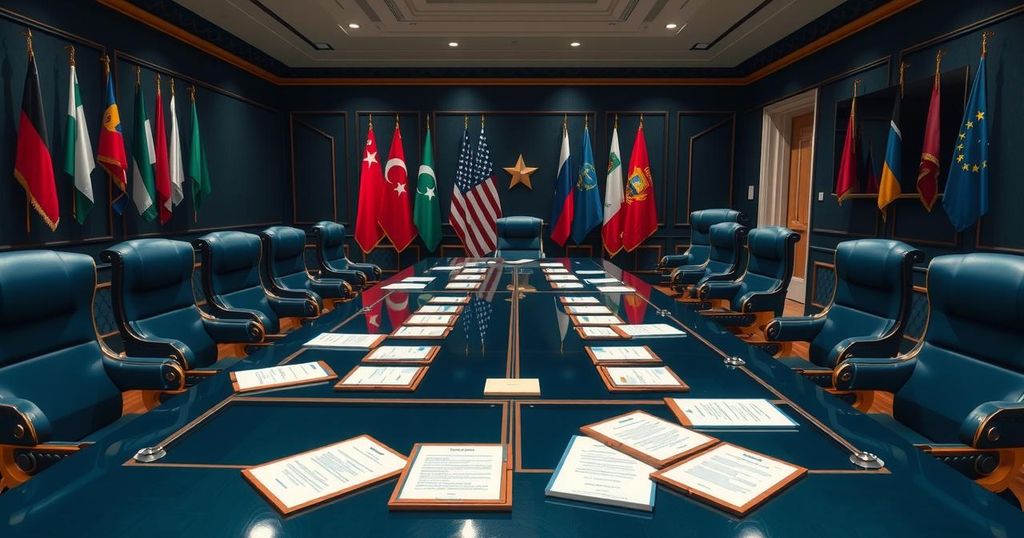Trump Challenges Ramaphosa on Farm Violence Allegations During Diplomatic Meeting

During a White House meeting, former President Trump challenged President Ramaphosa on unsubstantiated claims of farm seizures and violence against white farmers in South Africa. The diplomatic exchange turned confrontational, with Ramaphosa defending the legality and intentions behind land reforms. The fallout could impact U.S.-South African relations moving forward.
In an unexpected diplomatic turn during a meeting at the White House, South African President Cyril Ramaphosa encountered a significant challenge from former U.S. President Donald Trump regarding allegations of farm seizures and violence against white farmers in South Africa. What started as a discussion centered on trade and regional security abruptly shifted directions, creating a tense atmosphere. Trump, who has recently returned to office, pointedly questioned Ramaphosa about claims stating the government is confiscating farmland and that violence against white farmers is widespread.
The meeting, initially open to cameras for a brief period, quickly turned closed-door, with sources indicating that the tone became confrontational. One diplomat described the scene as feeling more like a setup than a high-level summit. Trump reportedly consistently pressed the South African leader on land reform issues, citing claims circulating within conservative media. He is said to have referred to previous allegations made in 2018 concerning state-sanctioned land grabs and killings of farmers.
Sources familiar with the meeting noted that Trump challenged Ramaphosa directly, asking, “Isn’t it true your government is taking land without compensation?” Trump also furnished printed screenshots from an American news outlet to bolster his assertions.
In contrast, President Ramaphosa responded with composure, emphasizing that South Africa’s land reform process is both legal and transparent. Ramaphosa sought to clarify the intentions behind the policy, stating that it is designed to rectify historical injustices rather than discriminate against any racial group. “There is no state policy of confiscation. There is no campaign of killing,” he asserted, reinforced by claims of South Africa being a “constitutional democracy.”
Regarding the accusations of violence against farmers, the evidence remains unclear. While South Africa has considered constitutional amendments for expropriating land without compensation, widespread confiscations have not occurred. The land reform initiative aims to redistribute property in a nation where apartheid previously concentrated land ownership among white South Africans. Indeed, both black and white farmers face violence in the country, but statistical data from the South African Police Service offers no confirmation that these actions are racially or politically driven.
In a 2018 statement, the U.S. Embassy in South Africa mentioned it had “no reason to believe that there is a deliberate campaign” targeting white farmers. The narrative suggesting genocide against these farmers has been effectively debunked by independent fact-checkers including Africa Check, the BBC, and Human Rights Watch.
Following the encounter, Ramaphosa’s office released a cautious statement highlighting a “frank exchange of views,” underscoring a desire for ongoing dialogue. Trump, on the other hand, took to social media to declare he had engaged Ramaphosa with “the truth the fake media won’t report.” Analysts now express concern that the fallout from this meeting could impact U.S.-South Africa relations, especially if not handled with care.
Addressing the media later, President Ramaphosa reiterated South Africa’s dedication to constitutional democracy and the principle of nonracialism, stating, “We remain committed to addressing our country’s challenges through democratic means and dialogue, ensuring that all South Africans, regardless of race, feel safe and valued.” Commentators in Johannesburg reflect mixed sentiments, with one stating, “It’s political theatre for Trump, but it puts Ramaphosa in a tight spot,” as being publicly confronted can be quite uncomfortable for any leader.
This diplomatic meeting turned confrontation highlights the ongoing tensions surrounding land reform in South Africa. Trump’s questioning of Ramaphosa places a spotlight on the controversial narratives driven by some within conservative circles. However, evidence shows that claims of systematic violence or state-sponsored land expropriation are largely unsubstantiated. The future of U.S.-South Africa relations hangs in the balance, punctuated by the strong statements and assertions made by both leaders during this encounter.
Original Source: www.thestkittsnevisobserver.com








